Wildlife Tourism: A Handbook for Guides, Tour Operators, Job-seekers and Business Start-ups
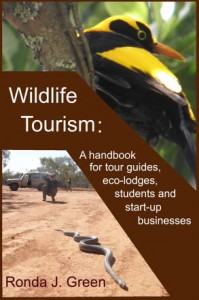 Most books on wildlife tourism are aimed at researchers and policy-makers. This one is more of a practical guide for those who want to work (or are already working) within the field of wildlife tourism as guides, ecolodge managers, wildlife park staff or other situations where they will be interpreting our wildlife to visitors and also making a living.
Most books on wildlife tourism are aimed at researchers and policy-makers. This one is more of a practical guide for those who want to work (or are already working) within the field of wildlife tourism as guides, ecolodge managers, wildlife park staff or other situations where they will be interpreting our wildlife to visitors and also making a living.
Coming more from an academic background than a business one (although I had once run a holiday farm), the business of starting and running a small business took me and my husband into a very steep learning curve. I knew little of the red tape involved, marketing, book-keeping, insurance, or working with booking agents. One of the aims of the book is to help others who may be in the same boat – starting out with loads of enthusiasm for wildlife and for haring their enthusiasm with others, but lacking experience in running a business venture.
Other readers come from the other direction – they’ve been running a tourism or related business but have an interest in including more wildlife experiences, and want to brush up their wildlife skills (bail knowledge and how to find, view and interpret animals), so there are chapters devoted to getting a grasp of the basics and links to further information.
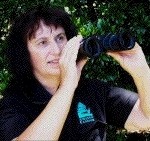
Ronda
For students and job-seekers there are also guidelines on what might appeal to your prospective employers.
Most of the examples are Australian, but there is ample general advice to be applicable anywhere in the world.
The book is available on Kindle
http://www.amazon.com/dp/B00HE1SX1Q
Printed versions are available from Andrew Isles bookstore:
http://www.andrewisles.com/all-stock/publication/wildlife-tourism-a-handbook-for-tour-guides-eco-lodges-students-and-start-up-businesses
A PayPal system will soon be set up for other online and printed copies. Until then, it can be purchased directly by electronic transfer, cheque or credit card: contact me (Ronda) on info@learnaboutwildlife.com if interested. Cost $27.50 plus postage ($5 Australian, $12 Asia-Pacific, $15 elsewhere)
Contents:
1 Introduction
-
Is this book for you?
-
The big picture: does wildlife tourism matter for our economy or for conservation?
-
Not just the facts ma’am (but not ignoring them either): why good interpretation is so important
-
What this book will do for you
-
Background experience of author
2. The basics
-
Skills you will need as a guide
-
Going a bit further: how to excel as a tour guide
-
Becoming self-employed as a tour operator or using your skills in other areas
3. Wildlife Skills 1: knowing the wildlife
-
Getting the ‘big picture’ of wildlife in Australia (or other countries): a good start for avoiding major errors and showing your guests what is different from their own homelands
-
Identifying wildlife: how to know what you’re looking at (or at least narrowing down the possibilities)
-
Finding out what species to expect in your district
4. Wildlife Skills 2: finding the wildlife
-
Knowing when and where to search
-
When you can’t see the wildlife: tracks, scratches, scats and sounds
5. Wildlife Skills 3: understanding the behaviour and ecology of wildlife
-
Why should you understand ecology?
-
Population ecology: why populations of animals of a particular species increase, decrease, stay the same or never enter a particular area.
-
Community ecology: interactions between species living in the same locality
-
Further notes on wildlife behaviour
6. Wildlife Skills 4: not disturbing the wildlife
-
How much disturbance can animals tolerate without changing their behaviour, avoiding you or even disappearing from the region?
-
How should we approach wildlife?
-
What happens to the wildlife you never see?
-
Feeding animals
-
Other interactions with animals
-
Wildlife habitat
7. Wider conservation issues
-
Not making them unhappy – general etiquette
-
Making them happy – Changing customer satisfaction to customer delight
-
Dealing with problems: avoiding them if possible, acting appropriately when they do happen
-
Feedback from customers, and what to do about it
9. People Skills 2: Interpretation
-
Enjoy your creativity
-
Not a school-room: remember people want to learn but are also here to enjoy themselves
-
Clarifying your goals: what would you most like them to remember and talk about?
-
What to tell them and how to tell it: the guided walk, drive or cruise
-
What to tell them and how to tell it: the information display
-
What to tell them and how to tell it: the self-guided nature trail
-
Learning about Interpretation techniques: links to further information
-
Testing: what best holds their interest and stays in their memories?
10. People Skills 3: Workplace, networking, and public relations
-
Why network?
-
Making face-to-face networking effective
-
Keeping records
-
Social media
-
Don’t forget your customers
-
Employer/employee and workmate relations
-
Starting an ecotourism venture
-
Staying afloat through the bad times
-
Hiring yourself out as a guide
-
Keeping records and projecting costs
13. Legal matters
-
Licences and permits needed for starting and running a tour business
-
Public liability – nowadays it’s risky not to have insurance, and there are some things you can’t legally do without it
-
Copyright (yours and others), slander and related topics
-
Hiring staff
-
Indigenous culture
-
Conservation legislation
14. Final note: Never-endingLearning and Innovation
-
Learning about wildlife
-
Nature interpretation and guiding techniques
-
Wildlife tourism literature
-
Market trends: keeping up to date with what your potential customers are looking for
-
Thinking creatively: it’s fun and often productive!
References and further reading
——————————————————————————-
The book is packed with links to useful websites and other publications on wildlife, environment education, conservation issues, bureaucracy of running a small business, and other essential topics.
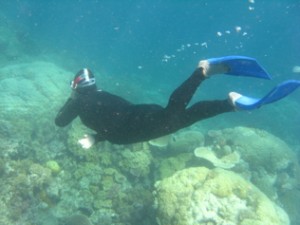
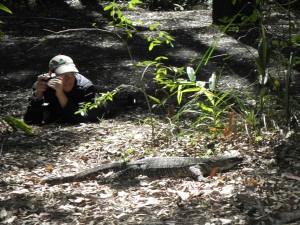 An American leader of youth activities emailed me to say the young
An American leader of youth activities emailed me to say the young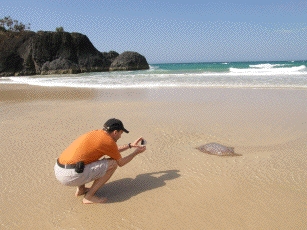 me interested persons here.
me interested persons here.


